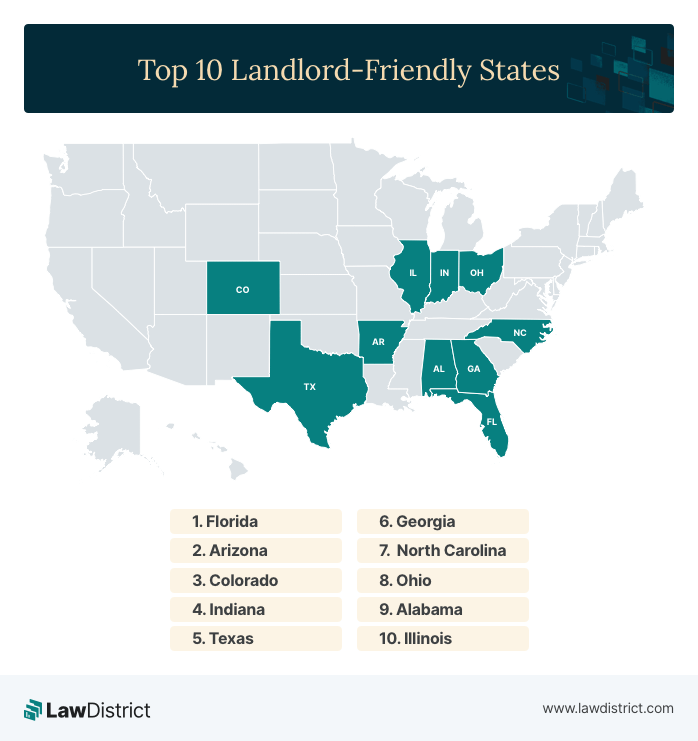Top 10 Landlord-Friendly States in 2024
When searching for a place to invest in real estate, the most crucial question to ask yourself is whether the area has landlord-tenant laws that can make owning a rental property more stressful. Choosing a landlord-friendly state will help you grow your wealth and personal worth.
Every state lays out specific rules and regulations that favor landlords or make it more challenging to own rental properties. For instance, landlord-friendly states have favorable eviction processes, rent increase terms, security deposit provisions, and relatively lower property taxes.
Landlord-friendly states protect the landlord's rights, helping them increase their return on investment. Let us discuss the characteristics of a landlord-friendly state and briefly look at the top 10 landlord-friendly states in 2024.
What Is a Landlord-Friendly State?
Each state has its own set of rental laws and regulations, but there are vital landlord-tenant laws you should investigate to ensure your rights are protected. When we ask what makes a state friendly to a landlord, the key areas to consider include:
- Minimal to no rental control: Some states impose a rent ceiling to restrict landlords from increasing rent. This policy significantly affects revenue during inflation.
- Simple eviction process: Certain states have lengthy and burdensome eviction processes—even when it involves clear cases where a tenant has defaulted payments or violated a lease agreement.
- Fair property taxes: Consider the local tax imposed on properties and choose one with relatively low rates.
Using these features as a guide, let us look at the top 10 landlord-friendly states in 2024
Best States to Own Rental Property
The best states to own rental property in the US are as follows:
- Florida
- Arizona
- Colorado
- Indiana
- Texas
- Georgia
- North Carolina
- Ohio
- Alabama
- Illinois
Now we will go through each one individually and explain what makes it uniquely good for this purpose.
1. Florida Rental Restrictions
Florida doesn't have rent control limitations, and charging late fees is not prohibited. In addition, they do not limit how much you can charge for security, but you must return it within 15–60 days after the tenant moves out. Florida also requires a written notice of three days before you can start the eviction process.
2. Arizona Rental Restrictions
Arizona has the lowest property tax in America at 0.62%. This state stands out because its non-compliance statutes force tenants to provide accurate information on the lease agreement and pay their rent on time. Furthermore, Arizona has multiple types of eviction notices, a 5-day notice for renters who damage the property and those late on payments as well as a 10-day notice for tenants who violate the lease agreement.
3. Colorado Rental Restrictions
Colorado landlords have control over when and how they increase the rent. It also does not have regulations on the late fees and security deposit amount landlords can charge. The greatest benefit of owning rentals in Colorado is the favorable eviction laws. The landlord is only required to give a 72-hour eviction notice, and if the tenant doesn't pay, they have 48 hours to vacate.
4. Indiana Rental Restrictions
Indiana's favorable housing costs and fair rental rates make it a popular choice for property investors. Additionally, the landlord can start the court proceedings for eviction 10 days after giving a notice. Indiana laws allow landlords to keep a security deposit for up to 45 days, giving them enough time to determine how much to deduct for damages.
5. Texas Rental Restrictions
Although it has the 7th highest property tax rate in the US at 1.83%, Texas landlord-tenant laws are significantly landlord-friendly. For example, they have no limits to security deposits, and a landlord and renter can enter into their own eviction agreement regarding repairs. Also, landlords can give tenants three days' notice when they violate the lease before eviction.
6. Georgia Rental Restrictions
According to Redfin, Georgia is considered one of America's fastest-growing states, making it an ideal destination for property investors. The eviction process in Georgia is informal. The landlord must give a 7-day notice, which does not have to be in writing. Afterward, they can initiate a legal process to have them removed.
7. North Carolina Rental Restrictions
North Carolina is a great place to invest in rental property because of its low property tax (0.77%), stable growing job market, and positive migration. In North Carolina, a landlord can give a renter termination notice a day after failing to pay rent. The Eviction Process in North Carolina required ranges from 2 days to 10 days before you can file an eviction lawsuit.
8. Ohio Rental Restrictions
Ohio is among the states with the highest property tax rate at 1.48%. Despite this high rate, Ohio qualifies as one of the landlord-friendly states because it does not set a security deposit limit, landlords only give a 3-day notice before filing for eviction, and you have control over the rent charged.
9. Alabama Rental Restrictions
Real estate investors consider Alabama as having relatively affordable rental properties. The landlord-tenant laws do not require you to have a landlord license to rent out your property. In addition, a landlord is free to charge late fees and increase the rent to any amount after a 30-day notice.
10. Illinois Rental Restrictions
Illinois is a landlord-friendly state due to its affordable property tax rate as well as not having restrictions on rental rates, late fee charges, and security deposits. Additionally, the state only requires you to give a 10-day notice before beginning the eviction process.
Map of Landlord-Friendly States
So far, we have seen that landlord-friendly states have landlord-tenant laws that favor the landlord more than the tenant. They have a relatively friendly legal provision for property owners. The following state map showcases these landlord-friendly states:

Where Is the Best State to Be a Landlord?
According to FortuneBuilder, Texas, Indiana, and Colorado are the best states to be a landlord. These states offer slightly more benefits to the landlord compared to the rest. For example, in Texas, the landlord-tenant laws emphasize the preservation of the landlord's rights when a tenant violates the lease. These states promote easier relief, reasonable compensation, and quick repossession of the rental unit.
Even in the best landlord-friendly states, you must give out legal documents and forms for your tenants to fill out and sign. Make sure that your Rental Applications, Residential Lease Agreements and Eviction Notices are up to snuff for your state.
Read more:Top Tenant Friendly States
Helpful Resources:
AZDOR
Redfin
Fortune Builders
Fortune Builders



